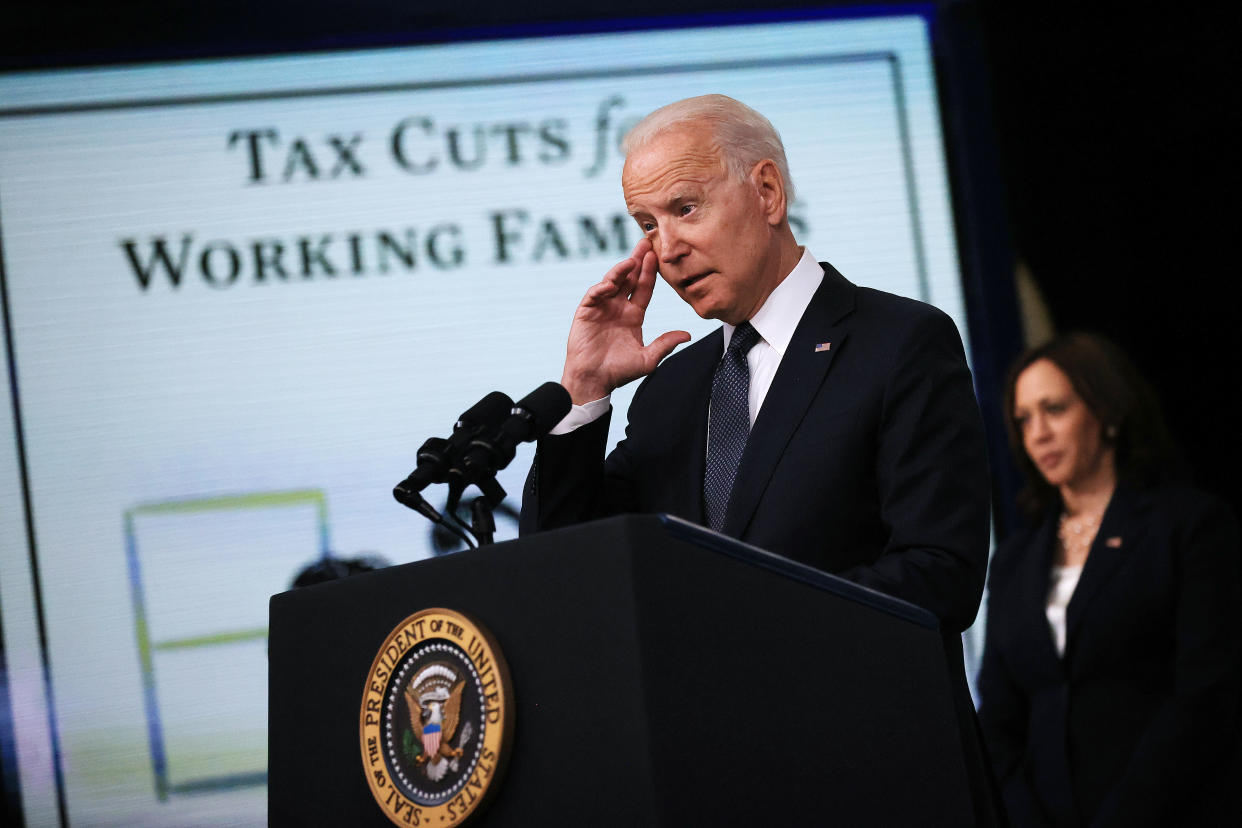Higher taxes may be on the way for wealthy Americans after House vote
Wealthy people are bracing for potentially higher taxes that could hit their bank accounts as soon as this year, while lower- and middle-income Americans could end up enjoying tax breaks from Uncle Sam that were originally only temporary.
Last week, the House passed a $3.5 trillion budget plan that may ultimately include numerous Democratic proposals for taxing high-income earners and corporations and expanding tax credits for middle- and low-income earners.
Democrats are still writing the formal legislation they plan to pass through reconciliation in the Senate. When their tax policies — if any — could go into effect still remains unclear.
“Congress rarely makes tax changes retroactive, [so] everything will probably be applied to the 2022 tax year,” Howard Gleckman, senior fellow at the Tax Policy Center, told Yahoo Money. “The one exception might be changes to the capital gains rate. If they're going to raise the rate, they would make the effective date of that rate increase the date that committees approved the legislation."
Here's what to know.

Raising the capital gains tax
One of President Joe Biden’s main tax proposals is targeting the investments of the top 0.3% by treating capital gains and income similarly. The proposal would mean wealthy individuals may pay double the current rate they pay on their investment returns and dividends.
Under the proposal, the top long-term capital gains and qualified dividends tax rate would increase to 39.6% from 23.8% and would apply to those earning over $1 million.
“Those are going to be very difficult for Congress to enact,” Gleckman said. “I think that there's some chance that Congress will raise the capital gains rate, but I don't think there's very much chance that it will raise it to what Biden wants.”
If passed, the capital gains change may be enacted immediately so investors don’t have the opportunity to sell assets en masse to avoid the rate increase, according to Gleckman.

Taxing assets upon death
Democrats also want to change how assets are taxed when passed onto heirs.
Under current tax law, the capital gain of inherited assets is calculated based on the value of the assets at inheritance — not when the assets were first acquired by the original owner. That means an heir typically pays much lower tax when those assets are sold.
Under Biden’s initial proposal, gains over $1 million for single filers ($2.5 million for joint filers when combined with existing real estate exemptions) would be taxed based on their value when initially acquired rather than inherited. Those gains may not be taxed if the property is donated, and certain exemptions would apply to family-owned businesses and farms.
That proposal is unlikely to gain enough support to be included in the final legislation, according to Gleckman.
“That's going to be a pretty tough sell,” he said. “You're already seeing a lot of pushback from people worried about family farms and small businesses, even though Biden's proposed significant exemptions and deferrals for them.”
Higher income tax
Under Biden’s original plan, the top individual income tax rate would revert back to 39.6% for taxable incomes above $400,000. That rate is currently 37%, established by the Tax Cuts and Jobs Act of 2017 passed during the Trump administration.
The current rate gives a couple with taxable income of $2 million an annual tax cut of more than $36,400, according to estimates by the Center on Budget and Policy Priorities.
“Raising the top individual rate I think is probably something that they'll do,” Gleckman said. “It is clearly only on very high income people. That one is probably one of the more likely changes.”
Tax compliance
The Democrats also plan to go after wealthy Americans by increasing tax compliance. Under Biden’s initial proposal, banks would have to report inflows and outflows from taxpayers’ accounts, giving the IRS additional information about business revenue and expenses to better target audits.
“The IRS needs more information,” Chuck Marr, senior director of federal tax policy at the Center on Budget and Policy Priorities, told Yahoo Money. “If the information is easily, very readily available for banks to provide, there's no excuse not to do it.”

Tax Credits
All these tax changes that target the wealthy would also help to pay for extending beefed-up tax credits that overwhelmingly put money in the pockets of middle- and low- income Americans.
Under Biden’s plan, the Child Tax Credit and the Earned Income Tax Credit would be extended through 2025 and made fully refundable permanently, meaning that taxpayers receive a refund even if the credit exceeds their total tax bill.
While an extension is likely to be included in the final legislation, it may be shorter than initially proposed, according to Gleckman, and the credits may be fully refundable for a few years rather than permanently.
“My sense is that they will agree to extend them, but probably not agree to extend them for very long,” he said. “They’re not going to have the money to extend it for what the Biden people would like to do.”
Denitsa is a writer for Yahoo Finance and Cashay, a new personal finance website. Follow her on Twitter @denitsa_tsekova
Read more personal finance information, news, and tips on Cashay
Read the latest financial and business news from Yahoo Finance
Follow Yahoo Finance on Twitter, Facebook, Instagram, Flipboard, LinkedIn, YouTube, and reddit

